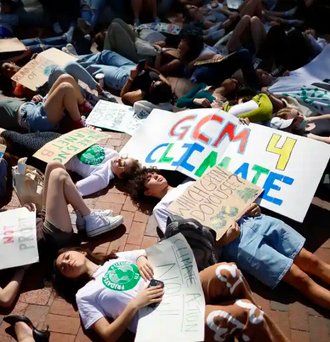
While the economy and abortion rights drove momentum behind the midterm election this year, voters in cities and states across the US also turned out to pass a number of climate ballot initiatives .
Among the measures passed were a historic multibillion-dollar investment into environmental improvement projects in New York state, including up to $1.5bn in funding for climate change mitigation. This election also saw a $50m green bond act pass in Rhode Island, and in Colorado, the city of Boulder approved a climate tax as well as a ballot measure that will allow the city to borrow against that tax to fund climate projects.
“Climate voters were the silent surprise of election night,” said Nathaniel Stinnett, the founder of the Environmental Voter Project. “We weren’t loud, and nobody saw us coming, but we showed up to vote in huge numbers.”
The electoral support at the state and local levels for more climate action comes at a time when world leaders meet in Sharm el-Sheikh, Egypt, to discuss the climate crisis at Cop27. Joe Biden and the House speaker, Nancy Pelosi, were both in attendance last week, urging leaders at home and abroad to meet the moment and take action against the climate crisis now. Because of the timing of the global summit and the US midterms, the Biden administration also had the pressure of a political shift that could mean stagnation of any further climate action after the president’s signature Inflation Reduction Act.
But for many voters, it’s the more local changes that matter most.
In New York state, the $4.2bn environmental bond act passed by an overwhelming majority, with 81% of voters casting their ballot in support of the measure.
“We were concerned because of how politically volatile this election was,” said Jessica Ottney Mahar, the New York director of strategy and policy at the Nature Conservancy who led a broad coalition to pass this measure. “Obviously, this is not a political issue; everyone needs clean water to drink and clean air to breathe. And that’s really what we talked about with people.”
In Rhode Island, the new green bonds act will allow the state to invest in climate resiliency at the municipal level, as well as local recreation, open space protection, brownfields remediation, and forest and habitat restoration.
The state’s department of environmental management described the measure – which passed with 66% of the vote – as a “big” win for Rhode Island.
“The bonds fund projects that people can see in their own backyard, really, in their own community,” said Terry Grey, the agency’s director.
Grey added that the piece of funding that will go towards resiliency efforts is crucial at this point in the fight against climate crisis. “No matter what we do in terms of decarbonization, the sea levels are still going to rise, the more significant storms are still going to come, so we have to invest in resiliency at the same time,” said Grey.
These ballot measures also proved popular in cities where climate change has hit many communities hard in recent years. In Boulder, Colorado, voters passed a climate tax that would collect approximately $6.5m annually. A portion of that tax revenue will go toward wildfire resiliency, which the city calls “a critical issue”.
“We’ve experienced some frightening close calls,” says Jonathan Koehn, the city’s director of climate initiatives. “And so we look at this and say – from catastrophic fires and floods to heatwaves – this is a chilling reminder that we have to prepare for this new normal of extreme weather that’s fueled by climate change.”
In El Paso, Texas, where residents have faced extreme heat as well as a volatile winter storm last year, voters passed three ballot propositions to invest $257.8m in street and park improvements, as well as $5m towards green infrastructure and other projects to mitigate the effects of the climate crisis.
Not every city and state with a climate measure on the ballot saw the same robust support of these initiatives. For example, Proposition 30 in California – which would have taxed high-income residents (those making above $2m) in order to encourage the sale of electric vehicles – failed. The measure was initially popular among voters before Governor Newsom came out in opposition to it, according to Inside Climate News.
In Arizona, Proposition 310, which would have increased the state’s sale tax by one-tenth of one per cent (0.1%) to fund fire districts, was narrowly defeated.
But there are still signs that climate remains an important issue for many voters.
“Climate policy is usually very popular,” said Stinnett, of the Environmental Voter Project, “but it’s rarely a top-of-mind-issue.” He notes that, in this way, ballot measures can be particularly helpful at moving climate action forward.
“We’re taking an issue that voters don’t usually think about when voting for Senate or governor, and we turn it into a binary choice – between either addressing the climate crisis or not addressing it,” he says.
This political action assures that voters have some control over the way their state and local communities are utilizing funds to fight the climate crisis – even if federal measures are stalled or face bigger hurdles, such as overcoming climate denialism in the House and Senate.
